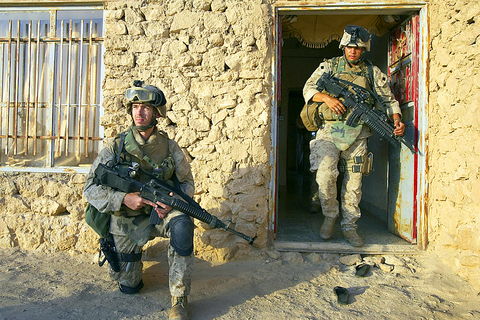They have never seen Juba. They hear him, but by then it's too late: a shot rings out and another US soldier slumps dead or wounded.
There is never a follow-up shot, never a chance for US forces to identify the origin, to make the hunter the hunted. He fires once and vanishes.
Juba is the nickname given by US forces to an insurgent sniper operating in southern Baghdad. They do not know his appearance, nationality or real name, but they know and fear his skill.

PHOTO: AP
"He's good," said Specialist Travis Burress, 22, a sniper with the 1-64 battalion based in Camp Rustamiyah. "Every time we dismount I'm sure everyone has got him in the back of their minds. He's a serious threat to us."
Gun attacks occasionally pepper the battalion's foot and mounted patrols, but the single crack of what is thought to be a Tobuk sniper rifle inspires particular dread.
Since February, the killing of at least two members of the battalion and the wounding of six more have been attributed to Juba.
Some think it is also he that has picked off up to a dozen other soldiers.
In a war marked by sectarian bombings and civilian casualties, Juba is unusual in targeting only coalition troops, a difficult quarry protected by armoured vehicles, body armor and helmets.
He waits for soldiers to dismount, or stand up in a Humvee turret, and aims for gaps in their body armour, the lower spine, ribs or above the chest. He has killed from 200m away.
"It was the perfect shot," the battalion commander, Lieutenant Colonel Kevin Farrell, said of one incident. "Blew out the spine."
"We have different techniques to try to lure him out, but he is very well trained and very patient. He doesn't fire a second shot."
Some in the battalion want marksmen to occupy rooftops overlooking supply routes, Juba's hunting ground, to try to put him in the cross-hairs.
"It would be a pretty shitty assignment because he's good," said Specialist Burress. "I think it's a sniper's job to get a sniper, and it'd probably take all of us to get him."
US snipers operate in teams of at least two people, a shooter and a spotter, the latter requiring more experience since he must use complicated formulae to calculate factors such as wind strength and drag coefficients.
Some worry that Juba is on his way to becoming a resistance hero, acclaimed by those Iraqis who distinguish between "good" insurgents, who target only Americans, and "bad" insurgents who harm civilians.
The insurgent grapevine celebrates an incident last June when a four-strong Marine scout sniper team was killed in Ramadi, all with shots to the head.
Unlike their opponents, US snipers in Baghdad seldom get to shoot. Typically they hide on rooftops and use thermal imaging and night vision equipment to monitor areas. If there is suspicious activity, they summon aircraft or ground patrols.
"We are professionals. There is a line between a maniac with a gun and a sniper," said Mike, 31, a corporal with a reconnaissance sniper platoon who did not want to his surname to be used.
He spoke during a 24-hour mission on a roof during which his team ate junk food and urinated into a bottle. During daylight they lay on the ground, immobile, to avoid being seen.
"It's not a glamorous life," he said.

PRECARIOUS RELATIONS: Commentators in Saudi Arabia accuse the UAE of growing too bold, backing forces at odds with Saudi interests in various conflicts A Saudi Arabian media campaign targeting the United Arab Emirates (UAE) has deepened the Gulf’s worst row in years, stoking fears of a damaging fall-out in the financial heart of the Middle East. Fiery accusations of rights abuses and betrayal have circulated for weeks in state-run and social media after a brief conflict in Yemen, where Saudi airstrikes quelled an offensive by UAE-backed separatists. The United Arab Emirates is “investing in chaos and supporting secessionists” from Libya to Yemen and the Horn of Africa, Saudi Arabia’s al-Ekhbariya TV charged in a report this week. Such invective has been unheard of

US President Donald Trump on Saturday warned Canada that if it concludes a trade deal with China, he would impose a 100 percent tariff on all goods coming over the border. Relations between the US and its northern neighbor have been rocky since Trump returned to the White House a year ago, with spats over trade and Canadian Prime Minister Mark Carney decrying a “rupture” in the US-led global order. During a visit to Beijing earlier this month, Carney hailed a “new strategic partnership” with China that resulted in a “preliminary, but landmark trade agreement” to reduce tariffs — but

Chinese President Xi Jinping’s (習近平) purge of his most senior general is driven by his effort to both secure “total control” of his military and root out corruption, US Ambassador to China David Perdue said told Bloomberg Television yesterday. The probe into Zhang Youxia (張又俠), Xi’s second-in-command, announced over the weekend, is a “major development,” Perdue said, citing the family connections the vice chair of China’s apex military commission has with Xi. Chinese authorities said Zhang was being investigated for suspected serious discipline and law violations, without disclosing further details. “I take him at his word that there’s a corruption effort under

China executed 11 people linked to Myanmar criminal gangs, including “key members” of telecom scam operations, state media reported yesterday, as Beijing toughens its response to the sprawling, transnational industry. Fraud compounds where scammers lure Internet users into fake romantic relationships and cryptocurrency investments have flourished across Southeast Asia, including in Myanmar. Initially largely targeting Chinese speakers, the criminal groups behind the compounds have expanded operations into multiple languages to steal from victims around the world. Those conducting the scams are sometimes willing con artists, and other times trafficked foreign nationals forced to work. In the past few years, Beijing has stepped up cooperation